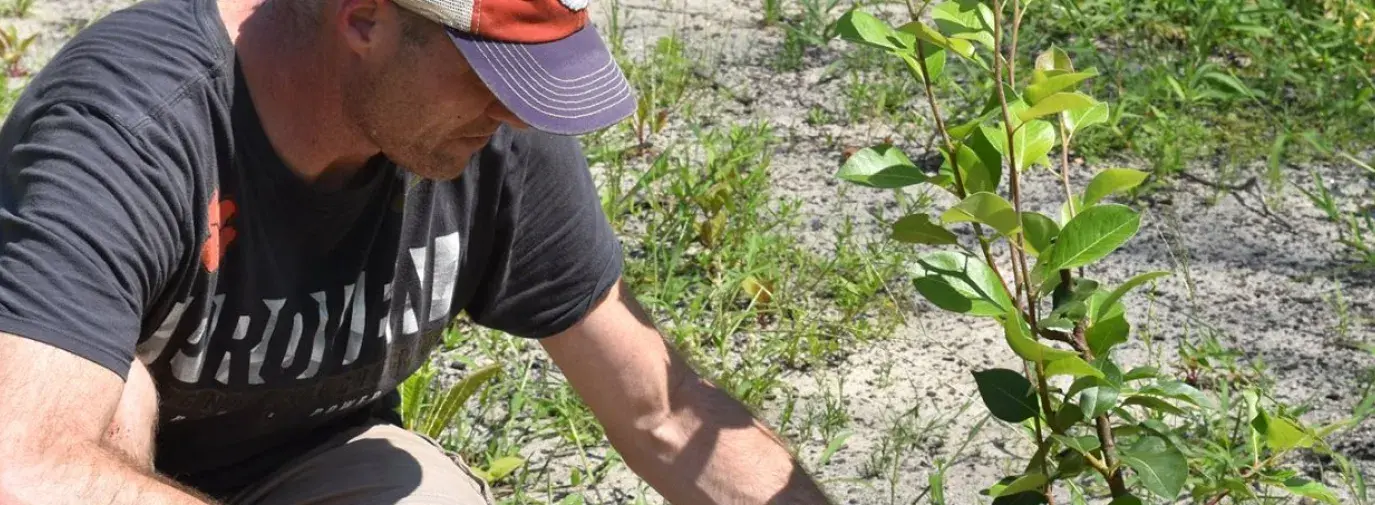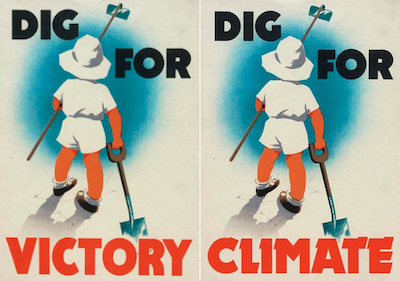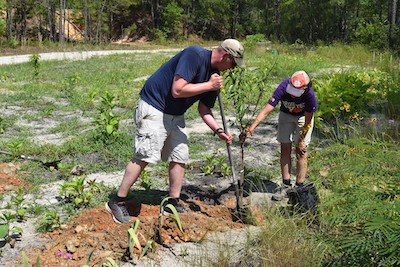
Written by Matt and Kara Rutter, founders of Project Victory Gardens, an agritherapy program in Aiken, South Carolina that brings together and supports veterans and a sustainable food system. They are also Climate Victory Gardeners, excited to share insight about how they identified and got started on their project.
Dig on for Victory
We have all seen the nostalgic posters promoting the World War II Victory Gardens. The posters are reminiscent of a time when every American was counted on to do their part. It was a time of great food insecurity due to a lack of labor, reallocation of transportation resources, and necessity to send food overseas. Americans responded in astounding fashion, with over 40 percent of the Nation’s produce supply raised in backyard gardens. Today we are once again on the brink of a food crisis and the need to mobilize.
According to the 2017 USDA Farm Census, the average age of the American farmer is 57.5 years, with one third over age 65. Our aging transportation infrastructure is unable to keep pace with demand. Record breaking weather across the Nation leaves farms unplanted and farmers holding the seed bag. Demand for year-round availability of produce and exotic food choices have increased food miles to an unsustainable level. Agriculture is a major contributor to climate change, and it’s also immensely impacted by the effects of climate change.

The Veteran Connection
At the same time, nearly 250,000 servicemembers transition out of the military each year. Almost half are under age 25 and lack a college degree, accounting for high unemployment rates. After almost two decades of sustained war, many veterans face PTSD, depression, and suicide. The US Departments of Agriculture and Veteran’s Affairs have identified that there may be a mutually beneficial solution to the issues that we see veterans face daily.
Encouraging veterans to enter agribusiness is a perfect match. Veterans have already demonstrated the drive, work ethic, and commitment to service needed to succeed in agriculture. Providing them with a launchpad to begin a career in agriculture is what is needed.
However, solving the farm labor problem is only half the benefit. The land is healing. Agritherapy and animal therapy have proven therapeutic for veterans suffering from PTSD and depression. Dirt contains microbes that trigger the release of serotonin in the body, improving mood, and decreasing anxiety. It’s a win-win solution.

Our Solution: Plant a Seed
As military veterans who retire next year after a combined 45 years of active service, we wanted to find a way to continue serving the Nation and our fellow military community. We knew that we wanted to find a way to utilize agritherapy to help veterans, servicemembers, and their families. But it had to be more than that.
In the Army we were trained to be problem-solvers. We saw three problems: food insecurity, the challenges of two decades of sustained war, and an aging farmer population. So, what is the solution to this national food crisis? The same solution that worked during World Wars I and II: Victory Gardens!
We decided to use our farm to train and encourage both our military family and the community-at-large to plant gardens. In doing so, they receive the benefits of agritherapy and animal therapy, combined with the education to launch their own agribusiness, thus increasing food security. Like our friends at Green America and Climate Victory Gardens, we know that if everyone plants a garden, we can address the food crisis in America. Regenerative soil practices can heal soil damaged by overuse or chemical treatments, while reducing harmful effects to the environment.
How We Got Started
In March, 2019 we started Project Victory Gardens on a picturesque 20-acre farm in Aiken, South Carolina and immediately the reaction and support were unbelievable, as was the work. While we had visions of petting chickens and planting seeds, launching an agribusiness requires you to don a lot of hats—caretaker, laborer, marketing director, financial manager, service provider—at times the list seems endless and daunting. And, yes, there’s paperwork.
Our first step was to form a Limited Liability Corporation. Once that was complete, we were in business!
The idea of getting back to the land resonates with many of our peers in the Army, and we know that eventually Project Victory Gardens will pop-up across the United States. So, we applied for federal servicemark status for the use of “Project Victory Gardens”. Applying for a trademark is an extensive, complicated, and lengthy process. Applications are often not even reviewed for months after filing. If you want to trademark a product name or servicemark your goat-yoga slogan, do your research! We put together a business plan based on several we found online.
Ultimately, we want to have heritage goats and pigs in our farm menagerie, but our current zoning restrictions limit the livestock we can keep, so we applied for rezoning from the county. This can be a long and often unsuccessful process. If you are planning on starting any business, please consult your local zoning regulations.
These are just some of the many decisions we had to make. Many Agricultural Extension Offices offer assistance on these higher-level activities, beyond pickle recipes and soil testing. Of course, we are partial to our local Clemson Cooperative Extension, but there are other great programs depending on your location.
To Tweet or Not to Tweet
We knew publicity was important too. We designed logos and marketing materials, bought the domain name, set up a website, and established a social media presence. Depending on your experience, much of this work may have to be outsourced. But don’t be afraid to just dive in and give it a try if you are on a shoestring budget. There are a lot of great website design sites out there or stick with the social media platforms until you get a little more established.
Do not neglect your online presence! Make do with what you have. Friends helped us shoot and edit an amazing promotional video. Use your resources and don’t be afraid to ask for help! After less than four months in “business” and with no official sales, we have an active following on Facebook and a presence on Instagram, LinkedIn, and Pinterest. This might ultimately translate into donor support, expanding our network for publicity, and helping veterans find our program.
Knock on doors! Do whatever it takes to get the word out about your passion. We are currently finalists for a large grant opportunity that we never dreamed was possible, simply because we applied. It may cost a few hours of your time, but it could be tremendously valuable!
Whether you are looking to start a full-scale agribusiness or plant a tomato on your apartment balcony, jump in! The time is now—our food system needs your help. Join the Movement, plant a Climate Victory Garden, and grow your own food now!
Read more inspiring Climate Victory Garden stories and tips.



